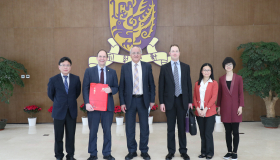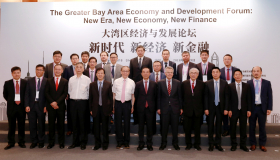Professor Xiong Wei, Dean of SME, CUHK-Shenzhen Wins China Economics Prize 2018
In recognition of his outstanding contributions in the field of finance, the National Economics Foundation awarded Professor Xiong Wei, Academic Dean of the School of Management and Economics (SME) of The Chinese University of Hong Kong, Shenzhen and Dean of the Shenzhen Finance Institute, the China Economics Prize 2018.

Professor Xiong Wei delivers a speech at the Greater Bay Area Economy and Development Forum
Professor Xiong Wei's main contribution is on how capital market friction and investor behavior bias lead to incompleteness and inefficiency in financial markets. His theory explains the possible consequences of highly leveraged financial intermediaries, including liquidity problems and contagion effects in the market. In behavioral finance, the theory he and partner put forward explains the principles that lead to asset bubbles and the impact of asset bubbles. He also made significant contributions to many aspects such as asset pricing under heterogeneous beliefs and distortions in beliefs in financial crises.
Professor Xiong Wei is currently the Academic Dean of the School of Management and Economics of The Chinese University of Hong Kong, Shenzhen. He also serves as Professor of Finance and Professor of Economics at Princeton University. Professor Xiong received his Bachelor's degree in Physics from the University of Science and Technology of China and his Ph.D. in Finance from Duke University. He is one of the most influential research scholars in the global financial community and has played an important role in both international academic circles and government decision-making. On June 26, 2018, Professor Xiong Wei became one of the first 15 scholars of Alibaba's Luohan Academy, which is composed of top international scholars, including Bengt Holmstrom, Founder of Contract Theory, Alvin E. Roth, president of the American Economic Association and other four Nobel Laureates in Economic Sciences.
The China Economics Prize was established by the National Economics Foundation in 2016. The purpose of the award is to encourage theoretical innovation, to prosper economic science, and to encourage and promote Chinese economists to contribute to the prosperity of economic science by rewarding Chinese scholars with outstanding contributions in the field of economics. The first China Economics Prize was awarded to Prof. Qian Ying from Tsinghua University and Professor Xu Chenggang from Cheung Kong Graduate School of Business in recognition of the contributions of the two scholars, including their research on the incentive mechanism of government and enterprises in the transition economy. Professor Zou Zhizhuang, Visiting Professor of SME, Director of the Shenzhen Finance Institute, Professor Emeritus of Princeton University, and Professor Chen Xiaohong of Yale University won the China Economics Prize 2017.
Along with Professor Xiong, Prof. Wang Jiang won the China Economics Prize 2018. He is the Dean of the Shanghai Institute of Advanced Finance at Shanghai Jiao Tong University and Professor of Finance at the Massachusetts Institute of Technology. Both of them have made outstanding contributions to the field of finance.

Professor Xiong Wei's research focuses on how capital market friction and investor behavior bias lead to incompleteness and inefficiency in global financial markets. He has published in top economics and finance journals on a wide range of research topics, such as asset pricing with heterogeneous beliefs, asset market contagion, limited investor attention, nonstandard investor preferences, financialization of commodity markets, belief distortions in the recent financial crisis, and market friction and inefficiency in China' s financial markets.
A brief description of Professor Xiong Wei's research: http://www.nefchina.org/index.php?id=451




